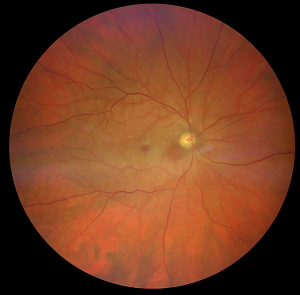
Duke Offers Innovative Care for Patients Suffering from Eye Stoke
People who suffer from sudden vision loss caused by retinal artery occlusion or eye stroke should be treated with the same urgency as those who suffer a stroke affecting the brain.
While considered a rare stroke (under 1% of all strokes), eye stroke causes permanent vision loss and devastating quality of life challenges. About one-third of those who have an eye stroke also have a brain stroke at the same time and remain at elevated risk for another stroke in the future.
A new multidisciplinary clinic at Duke plans to provide more seamless treatment for those who have suffered eye strokes. A collaboration between Duke Neuro-ophthalmology Division Chief, Chantal Boisvert, OD, MD, and Duke neurologist Brian Mac Grory, MB BCh BAO, MRCP (UK), the clinic will be the only one of its kind in the country.
“We are excited to offer this unique combined clinic that will improve the care of patients suffering from retinal artery occlusion by streamlining care – two specialties seeing the patient on the same day provides a convenience for the patient and allow us to manage the patient more effectively - together right in the same clinic not weeks apart,” says Boisvert.
This collaboration will offer combined expertise in a clinic that will allow for patients to see an ophthalmologist and a neurologist in the same location. Patients can receive follow-up care for the eye stroke, and at the same time, undergo diagnostic testing to better understand and reduce their risk of another stroke. Eye stroke patients often must see many doctors across various practices. This novel clinic simplifies the patient experience.
The only symptom of an eye stroke is sudden vision loss and the diagnosis can sometimes be overlooked. Eyes are as important as the brain – eye stroke is an indication that the vascular system is not healthy.
Eye stroke does not currently receive the same awareness and immediate care as brain stroke. Tragically, a commonly used medication for treating brain stroke – tPA – may be just as effective at treating eye strokes. However, by the time patients arrive to emergency medical attention, it is usually too late for this medication (which must be given within 4.5 hours of symptoms starting).
“A person can be going about their day and all of a sudden permanently lose vision in one eye, the vision loss is not always recognized as a stroke and can be seriously disabling. Knowing so many patients go on to have a brain stoke, it’s important that we coordinate care to maximize treatment for the patient said Mac Grory.”
“It is very common that patients who have sudden loss of vision in one eye may wait to tell someone, thinking their vision may come back, or if they do talk to someone they may not be taken seriously,” Boisvert said. “A stroke in the eye should be considered an emergency.”
Raising awareness for eye strokes and educating other healthcare providers is an important goal for Boisvert and Mac Grory. When patients have an eye stroke, it is imperative to go to the nearest hospital first. Helping patients and healthcare providers to understand the urgency of the condition will help patients get treatment quicker. The clinic will serve as a resource for follow up visits.
“We want to inform primary care, emergency department and other eye care providers of the importance of immediate triage for this condition and offer solutions for patients who suffer from the devastating effects of eye stroke, says Boisvert.”
In addition to treating stroke of the eye, this clinic will also offer treatment for people who have suffered with other visual changes caused by stroke. This includes problems with seeing due to injury to the visual pathways in the brain, problems with eye muscles caused by stroke and problems with blood flow to the optic nerve (the connection between the eye and brain).
Research and training for residents and fellows are also among the priorities. A core part of the mission of the clinic will be outreach and advocacy work across North Carolina and the surrounding states. Drs. Mac Grory and Boisvert are founding a first-of-its-kind registry of patients with eye stroke which will provide sorely needed data on the long-term impact of eye strokes, the effect of treatment and the risk of future stroke. They are actively seeking collaborators on this registry and encourage anyone interested to reach out to them.
Boisvert and Mac Grory hope to change the way eye stroke is treated by offering a unified approach to care while educating key stakeholders in the process and hope other medical centers and institutions adopt our model to best care for patients suffering from this debilitating condition.